Home » Posts tagged 'Nick Rodrigo'
Tag Archives: Nick Rodrigo
A Critical History of Incarceration in New York City
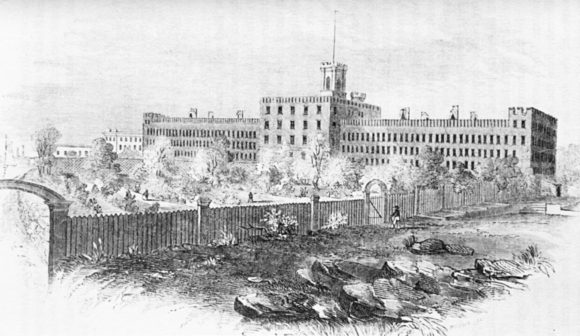
Dr. Jayne Mooney is an Associate Professor of Sociology at John Jay and a member of the doctoral faculty of Women’s Studies and Sociology at the CUNY Graduate Center. She is also a director and founding member of the Critical Social History Project (CSHP), a research initiative and part of John Jay’s Social Change and Transgressive Studies Project that draws on archival material to shed light on the history of incarceration in New York City.
The project began in 2015 with a conversation spurred by reporting on abuse, poor conditions, and a rash of tragedies at Rikers Island; how best, Mooney and colleagues wondered, to preserve the memories of those who had been affected by the infamous jail, including not only the incarcerated but also their friends and families, guards and educators? And so they began the “Other City” project, which forms the largest component of the CSHP. Informed by their research into the history of New York’s penitentiary system, Mooney’s working group is pointing out the problems inherent in Mayor Bill de Blasio’s administration’s proposal to close Rikers and open four new city jails.
“On the most basic level, what we’re showing is that the current proposals are reinventing the wheel. It’s the same thing that’s always happened. Closing an institution and setting it up again, you’re going to have the same problems, because you’re not getting to those deep-rooted, structural issues,” says Mooney.
Reinventing the Wheel
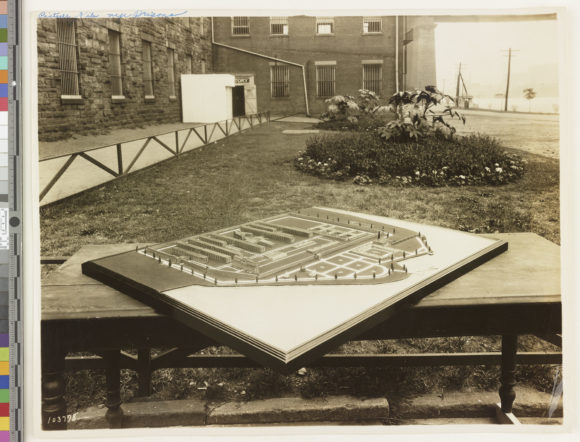
In a forthcoming article, “Rikers Island: The Failure of a ‘Model’ Penitentiary” due to be published in The Prison Journal in 2020, Mooney and her co-author, CUNY graduate student Jarrod Shanahan, go through the instructive failures of incarceration reform in New York City back to the 1735 construction of the Publick Workhouse and House of Correction. They argue that a lack of historical documentation has allowed policymakers to strategically “forget” the failures of past “model” or “state of the art” institutions, continually replacing old jails with new without a look at the larger issues that have led to waves of highly praised but ultimately unsuccessful penal reform.
Set against the backdrop of historical, social and political context, Rikers’ closure and the proposals to replace it look familiar. “All of these places opened in the spirit of optimism—everything was going to change. And then everything goes wrong, these institutions are denounced as embarrassments, and the decision is made to close them down and rebuild. Of course, that’s what’s been happening in the present moment,” Mooney says. She and her colleagues encourage the Mayor’s Office to look beyond the walls of the prison for new solutions to social problems faced by New York and, indeed, the United States.
(Read her December 2019 letter to The Guardian on the subject, “Rikers has failed like others before it, but the solution is not new jails.”)
Preserving Voices, Preserving Justice
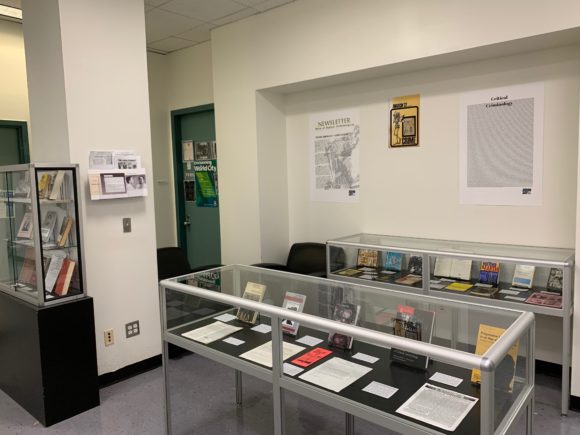
Mooney’s challenge to the new proposals is grounded not only in her work in political social history, but also in her background as a critical criminologist. “There’s a very strong abolitionist line all the way through critical criminology,” she notes, which informs the way the Critical Social History Project has approached critiques of the plan to build new jails.
The CSHP isn’t only focused on documenting mass incarceration in NYC. As the Vice Chair of the American Society of Criminology’s Critical Criminology and Social Justice Division, as well as the archivist, Mooney has been accumulating archival information related to the division and the field’s history of activism. The CSHP’s Preserving Justice component, jointly directed by Mooney and Visiting Scholar Albert de la Tierra, has created an exhibition in the Sociology Department displaying some of the core critical criminology texts. It’s open to any students, faculty or staff who are interested in the history of the field and the work of its important thinkers.
Expanding Research Horizons
Mooney is proud to talk about her team of dedicated researchers, which includes both undergraduate and graduate students. With the help of their diverse experiences and interests, the Critical Social History Project is expanding its remit, from the history of Rikers Island to topics including the history of women’s incarceration, other New York carceral institutions including the Tombs and Sing-Sing, mental illness and incarceration, and more. Together, they are showing the persistence of the problems related to the history of mass incarceration, no matter where in history you begin your research—up to and including the present day.
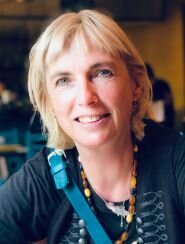 The Critical Social History Project is directed by Jayne Mooney and Albert de la Tierra. Other members are Sara Salman (Victoria University of Wellington), Nick Rodrigo, Jacqui Young, Susan Opotow and Louis Kontos, as well as John Jay students Camilla Broderick, Anna Giannicchi, Tayabi Bibi, Andressa Almeida, Marcela Jorge-Ventura, and Audrey Victor.
The Critical Social History Project is directed by Jayne Mooney and Albert de la Tierra. Other members are Sara Salman (Victoria University of Wellington), Nick Rodrigo, Jacqui Young, Susan Opotow and Louis Kontos, as well as John Jay students Camilla Broderick, Anna Giannicchi, Tayabi Bibi, Andressa Almeida, Marcela Jorge-Ventura, and Audrey Victor.
You can learn more by visiting the Critical and Social History Project’s website.
Podcasting at John Jay: Making Research Accessible
If you’re like us, you love podcasts enough that you’ve subscribed to more than you can listen to in a week of subway commutes. Podcasting, then called online radio, rose in popularity with the proliferation of mp3 players in the early 2000s. In tandem with other personal platforms like blogs, podcasts exemplified the “democratizing spirit” of the internet.
Today, they are big business. Since the release of Serial in 2014, podcasts have boomed. Monthly listeners have nearly doubled since 2014, from around 39 million Americans to an estimated 90 million. As the listening audience grows, quality improves, and bigger names get interested in the medium, advertisers are investing millions.
At John Jay, interest in podcasting has risen along with the medium’s growing potential. The college is home to a variety of podcasts, run by students, faculty and staff, on a rainbow of topics. For example, students in the English department work with Professor Christen Madrazo to write, produce, and edit Life Out Loud, which highlights the diverse voices and real stories of John Jay’s student body. We also have faculty working on podcasts hosted outside John Jay, podcasts run by research centers, and faculty and staff who produce their own shows, right here on campus.
We will introduce you to two homegrown John Jay podcasts that seek to translate scholarship into a form that everyone can understand. Meet Kathleen Collins, a Reference Librarian and Professor at John Jay College, and Nick Rodrigo, a CUNY Ph.D. candidate and John Jay College adjunct professor. While Kathleen is on her 38th episode of podcast Indoor Voices, and Nick has just released the first six episodes of They Are Just Deportees, both share the desire to take CUNY research out of the ivory tower and bring it to the community.
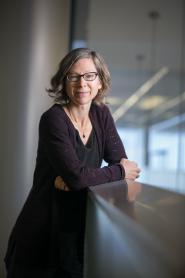 Kathleen Collins has been producing Indoor Voices since the summer of 2017. She started the podcast as “a way to highlight the fascinating things going on around CUNY that might not be widely known. There are so many inhabitants in the CUNYverse doing incredibly interesting things… We like being able to provide a low-stakes, easy-to-share platform for people to talk about their work.”
Kathleen Collins has been producing Indoor Voices since the summer of 2017. She started the podcast as “a way to highlight the fascinating things going on around CUNY that might not be widely known. There are so many inhabitants in the CUNYverse doing incredibly interesting things… We like being able to provide a low-stakes, easy-to-share platform for people to talk about their work.”
To Kathleen, the conversations are the key element. She and her co-host, La Guardia Community College librarian Steven Ovadia, interview CUNY faculty, students, alumni and staff members about their research or creative output; they have a great deal of leeway to highlight what interests them.
 Nick Rodrigo is new to podcasting, overcoming challenges as he meets them in the course of creating They Are Just Deportees. The newly-launched show examines the various ways in which the U.S. immigration enforcement system shapes and controls the lives of migrant communities in this country. With co-host Darializa Avila Chevalier, TAJD helps listeners to understand “the multiple sites of border enforcement in the U.S., and the punitive effects of the country’s periodic moral panics on the ‘criminal alien.'”
Nick Rodrigo is new to podcasting, overcoming challenges as he meets them in the course of creating They Are Just Deportees. The newly-launched show examines the various ways in which the U.S. immigration enforcement system shapes and controls the lives of migrant communities in this country. With co-host Darializa Avila Chevalier, TAJD helps listeners to understand “the multiple sites of border enforcement in the U.S., and the punitive effects of the country’s periodic moral panics on the ‘criminal alien.'”
Nick, and his associates in the Social Anatomy of a Deportation Regime Working Group (the sponsor of the podcast), think this is a particularly relevant topic. “Immigrant rights have come under increasing threat from the state, with bans on immigration from Muslim majority countries, the detention of children at the U.S./Mexico border, and the pledge of this administration to increase the forced removal of all undocumented people. … It is vitally important that the deportation system — which expels up to 300,000 persons a year — be placed in the historical context of this country’s treatment of the ‘other,’ while focusing on the real time implications of the current system on immigrant communities.”
For both showrunners, podcasting is a great way to make sometimes-complex issues and scholarship more accessible to an average listener. Says Nick, “two of the major issues in scholarship today are the ‘ivory tower’ mentality of academics and a lack of interdisciplinary focus on major social issues. Conferences and public lectures can be delivered in such inaccessible language that they can be alienating to non-academics. Podcasting allows for the complex issues concerning immigration enforcement to be distilled and presented to the public in a way that is accessible and digestible, with the opportunity for the listener to pause, reflect, and reengage at their own pace. Podcasting also provides a platform for criminologists, sociologists, public health experts, geographers, and journalists to come together on an issue and, if the interview structure is good, a compelling narrative for change can be constructed.”
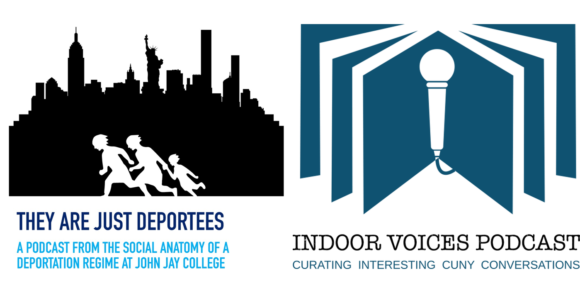
Kathleen also wants to make it easier for non-experts to engage with what CUNY produces. “There is so much going on within CUNY,” she says, “and it shouldn’t be hidden inside the academy. Podcasts are a good way to get people interested in new things — it’s a mini, portable seminar for your ears. But since Steve and I act as generalists in our role as interviewers, we can hopefully elicit a layman’s interpretation of what scholars are thinking and writing about. The point is to bring attention to the author or artist, and ask about their research and writing process and teaching — these topics bring the conversation to a universal level.”
Creating content to fit the platform can sometimes be challenging. Nick was “forced to learn new skills on the job,” but found that his struggles with editing gradually turned into confidence! Kathleen cites the extensive support and inspiration from other podcasters and staff at the college as a source of her success and joy in creating Indoor Voices.
In the end, she says she loves every episode she produces — thanks to the satisfying conversations and intimate connections she can form with guests during a 40 minute interview, each new episode supplants the last as her new favorite.
Check out the latest episodes of Indoor Voices, They Are Just Deportees, and more John Jay podcasts:
- Indoor Voices: J Journal founders Adam Berlin and Jeffrey Heiman have been producing the literary magazine for twelve years. The high quality creative work they feature deals with contemporary justice issues, but not always in a way you might expect.
- They Are Just Deportees: You can find the first six episodes on the Social Anatomy of a Deportation Regime website, or by searching on Spotify.
- Reentry Radio: The latest episode of the podcast produced by John Jay’s Prisoner Reentry Institute deals with employment discrimination against justice-involved individuals, with special guest Melissa Ader of the Legal Aid Society’s Worker Justice Project.
- This World of Humans: Host Nathan Lents talks to Hunter College researcher Dr. Jill Bargonetti about using mouse models to study triple-negative breast cancer.



Recent Comments